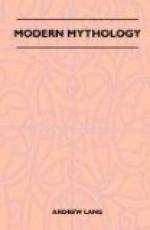For all these reasons ancient riddles cannot explain the obscurity of mythological names. As soon as the name was too obscure, the riddle and the name would be forgotten, would die together. So we know as little as ever of the purely hypothetical process by which a riddle, or popular poetical saying, remains intelligible in a language, while the mot d’enigme, becoming unintelligible, turns into a proper name—say, Cronos. Yet the belief in this process as a vera causa is essential to our author’s method.
Here Mr. Max Muller warns us that his riddle theory is not meant to explain ’the obscurities of all mythological names. This is a stratagem that should be stopped from the very first.’ It were more graceful to have said ‘a misapprehension.’
Another ‘stratagem’ I myself must guard against. I do not say that no unintelligible strings of obsolete words may continue to live in the popular mouth. Old hymns, ritual speeches, and charms may and do survive, though unintelligible. They are reckoned all the more potent, because all the more mysterious. But an unintelligible riddle or poetical saying does not survive, so we cannot thus account for mythology as a disease of language.
Mordvinian Mythology
Still in the very natural and laudable pursuit of facts which will support the hypothesis of a disease of language, Mr. Max Muller turns to Mordvinian mythology. ‘We have the accounts of real scholars’ about Mordvinian prayers, charms, and proverbs (i. 235). The Mordvinians, Ugrian tribes, have the usual departmental Nature-gods—as Chkai, god of the sun (chi=sun). He ‘lives in the sun, or is the sun’ (i. 236). His wife is the Earth or earth goddess, Vediava. They have a large family, given to incest. The morals of the Mordvinian gods are as lax as those of Mordvinian mortals. (Compare the myths and morals of Samos, and the Samian Hera.) Athwart the decent god Chkai comes the evil god Chaitan—obviously Shaitan, a Mahommedan contamination. There are plenty of minor gods, and spirits good and bad. Dawn was a Mordvinian girl; in Australia she was a lubra addicted to lubricity.
How does this help philological mythology?
Mr. Max Muller is pleased to find solar and other elemental gods among the Mordvinians. But the discovery in no way aids his special theory. Nobody has ever denied that gods who are the sun or live in the sun are familiar, and are the centres of myths among most races. I give examples in C. and M. (pp. 104, 133, New Zealand and North America) and in M. R. R. (i. 124-135, America, Africa, Australia, Aztec, Hervey Islands, Samoa, and so on). Such Nature-myths—of sun, sky, earth—are perhaps universal; but they do not arise from disease of language. These myths deal with natural phenomena plainly and explicitly. The same is the case among the Mordvinians. ’The few names preserved




